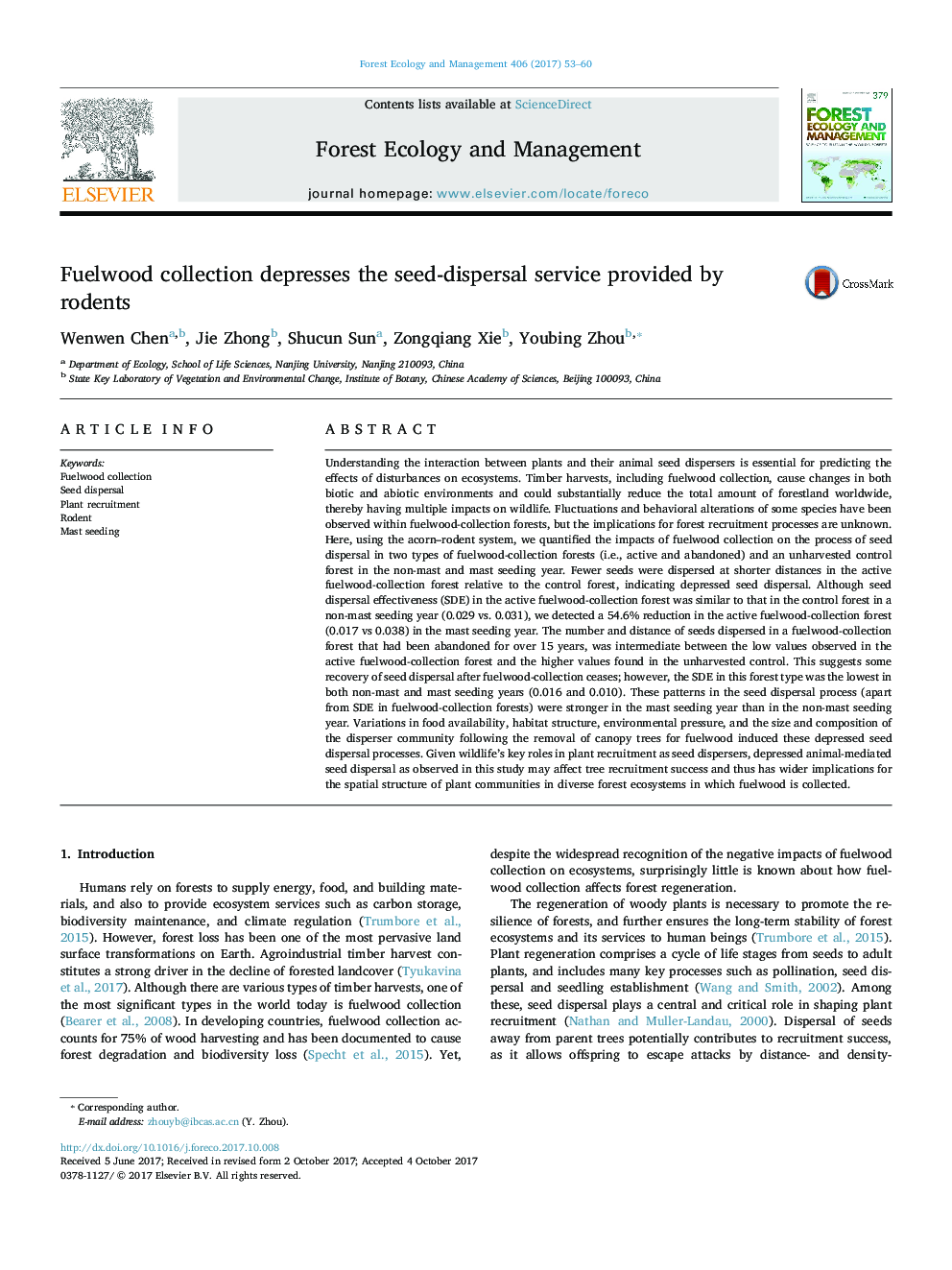| کد مقاله | کد نشریه | سال انتشار | مقاله انگلیسی | نسخه تمام متن |
|---|---|---|---|---|
| 6542004 | 1421352 | 2017 | 8 صفحه PDF | دانلود رایگان |
عنوان انگلیسی مقاله ISI
Fuelwood collection depresses the seed-dispersal service provided by rodents
ترجمه فارسی عنوان
جمع آوری چوب سوختی باعث کاهش خدمات دانه بندی شده توسط جوندگان می شود
دانلود مقاله + سفارش ترجمه
دانلود مقاله ISI انگلیسی
رایگان برای ایرانیان
کلمات کلیدی
جمع آوری چوب سوخت پراکندگی دانه، استخدام گیاهی، جوندگان کاشت مشت،
موضوعات مرتبط
علوم زیستی و بیوفناوری
علوم کشاورزی و بیولوژیک
بوم شناسی، تکامل، رفتار و سامانه شناسی
چکیده انگلیسی
Understanding the interaction between plants and their animal seed dispersers is essential for predicting the effects of disturbances on ecosystems. Timber harvests, including fuelwood collection, cause changes in both biotic and abiotic environments and could substantially reduce the total amount of forestland worldwide, thereby having multiple impacts on wildlife. Fluctuations and behavioral alterations of some species have been observed within fuelwood-collection forests, but the implications for forest recruitment processes are unknown. Here, using the acorn-rodent system, we quantified the impacts of fuelwood collection on the process of seed dispersal in two types of fuelwood-collection forests (i.e., active and abandoned) and an unharvested control forest in the non-mast and mast seeding year. Fewer seeds were dispersed at shorter distances in the active fuelwood-collection forest relative to the control forest, indicating depressed seed dispersal. Although seed dispersal effectiveness (SDE) in the active fuelwood-collection forest was similar to that in the control forest in a non-mast seeding year (0.029 vs. 0.031), we detected a 54.6% reduction in the active fuelwood-collection forest (0.017 vs 0.038) in the mast seeding year. The number and distance of seeds dispersed in a fuelwood-collection forest that had been abandoned for over 15 years, was intermediate between the low values observed in the active fuelwood-collection forest and the higher values found in the unharvested control. This suggests some recovery of seed dispersal after fuelwood-collection ceases; however, the SDE in this forest type was the lowest in both non-mast and mast seeding years (0.016 and 0.010). These patterns in the seed dispersal process (apart from SDE in fuelwood-collection forests) were stronger in the mast seeding year than in the non-mast seeding year. Variations in food availability, habitat structure, environmental pressure, and the size and composition of the disperser community following the removal of canopy trees for fuelwood induced these depressed seed dispersal processes. Given wildlife's key roles in plant recruitment as seed dispersers, depressed animal-mediated seed dispersal as observed in this study may affect tree recruitment success and thus has wider implications for the spatial structure of plant communities in diverse forest ecosystems in which fuelwood is collected.
ناشر
Database: Elsevier - ScienceDirect (ساینس دایرکت)
Journal: Forest Ecology and Management - Volume 406, 15 December 2017, Pages 53-60
Journal: Forest Ecology and Management - Volume 406, 15 December 2017, Pages 53-60
نویسندگان
Wenwen Chen, Jie Zhong, Shucun Sun, Zongqiang Xie, Youbing Zhou,
